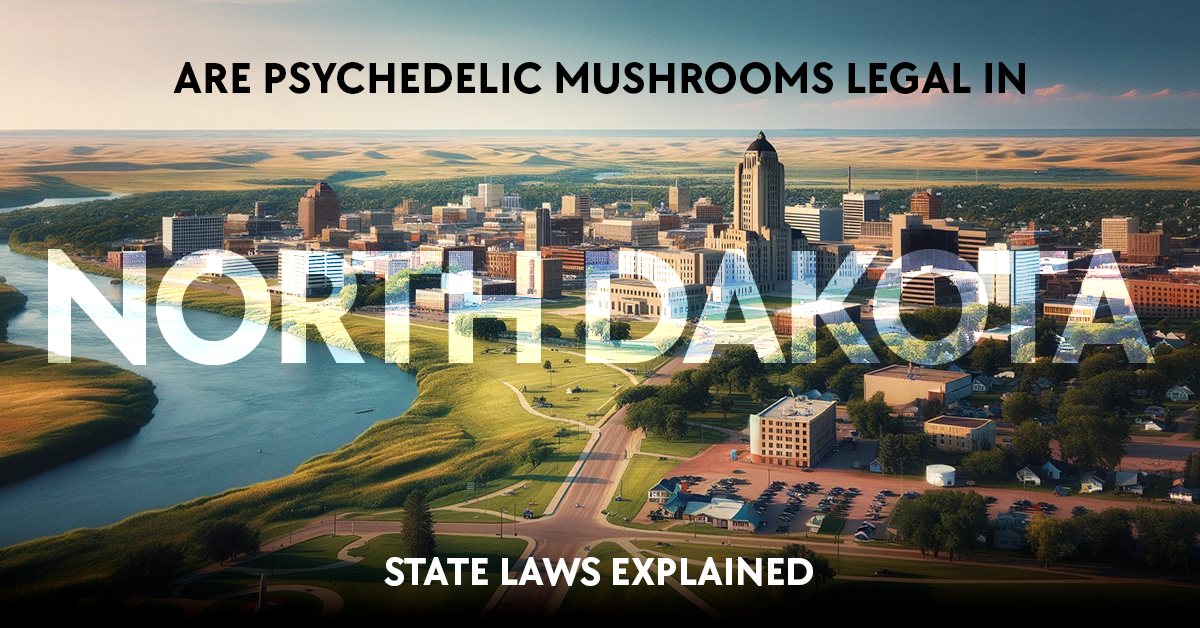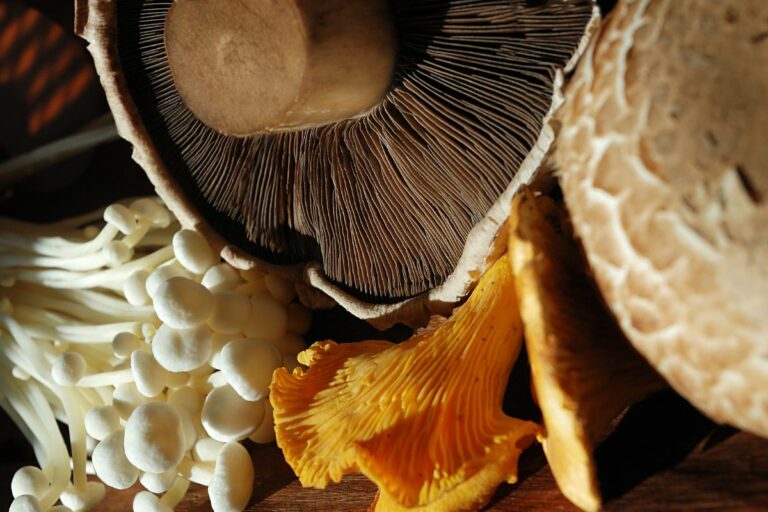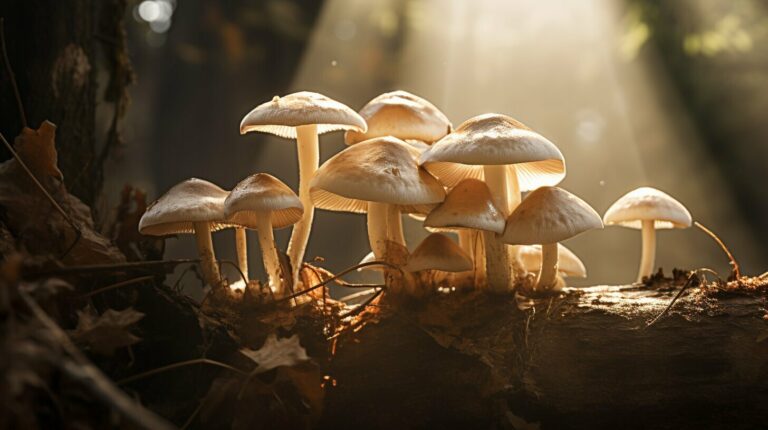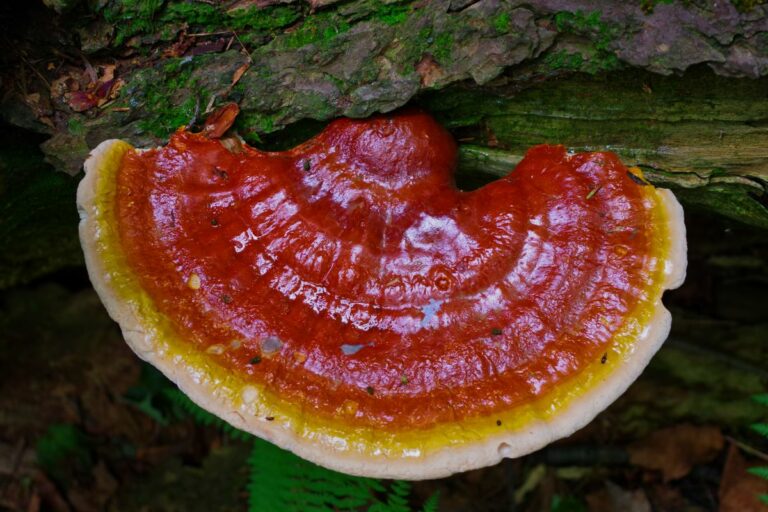Psychedelic mushrooms, also known as psilocybin mushrooms, have a complex legal status in the United States. As you investigate the legality of these substances, it is important to consider the specific laws that apply within each state. In North Dakota, the possession, sale, and cultivation of psychedelic mushrooms are illegal under both state and federal law. Psilocybin, the active hallucinogenic compound found in these mushrooms, is classified as a Schedule I controlled substance, indicating that it is considered to have a high potential for abuse and no accepted medical use.

Navigating the legal landscape can be difficult since laws regarding psychedelic substances have been evolving across the country. Although there has been a push in some parts of the United States to decriminalize or even legalize psychedelic mushrooms for medicinal and therapeutic use, these changes have not been reflected in the laws of North Dakota. If you’re in North Dakota, possessing psychedelic mushrooms can result in significant legal consequences, including fines and imprisonment. It’s crucial to keep in mind that while some states and cities have moved toward decriminalization, this does not equate to legalization, and such progressive policies have not been adopted in North Dakota.
Legal Status of Psilocybin in North Dakota
Table of Contents
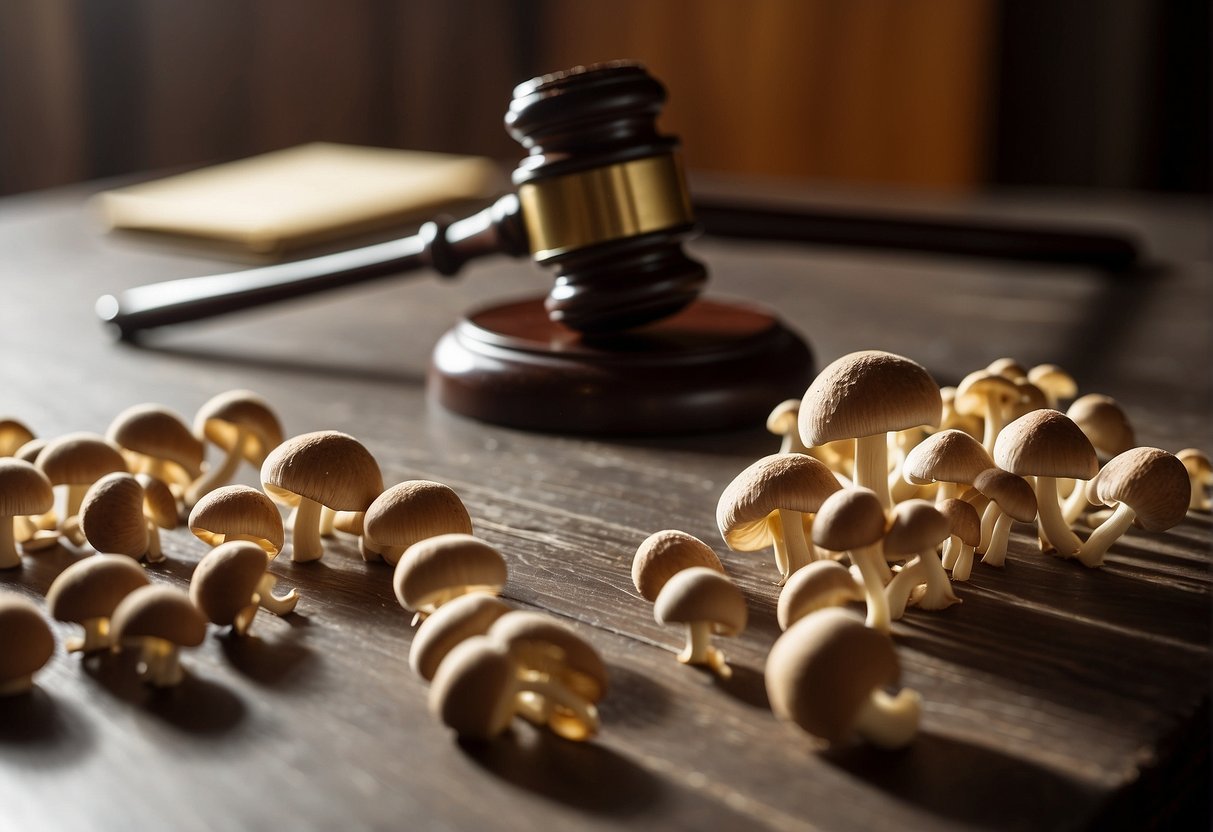
The legal landscape for psilocybin mushrooms in North Dakota is clearly defined. Being aware of these legal boundaries is essential for your understanding and compliance with state and federal laws.
State Legislation on Psilocybin Mushrooms
In North Dakota, psilocybin mushrooms are currently classified as illegal. State legislation strictly prohibits the possession, sale, and distribution of psilocybin, as it is not recognized for medicinal use and has a high potential for abuse. This positions psilocybin mushrooms as a Schedule I drug within the state’s controlled substances list.
Federal Regulation: Controlled Substances Act
At the federal level, the Controlled Substances Act maintains psilocybin as a Schedule I drug. This puts it in the same category as heroin and LSD, indicating no currently accepted medical use and a lack of safety for use under medical supervision. Your possession or use of psilocybin mushrooms can lead to federal charges, irrespective of the state’s stance.
Comparison to Other States
It is important to note that while North Dakota follows federal guidelines closely, some other states have deviated slightly in their approach. California, Colorado, and Oregon have initiated movements to decriminalize or allow medicinal use of psilocybin mushrooms to varying extents. This contrasts sharply with states like Georgia and Idaho, where there has been no legislative movement towards decriminalization, similar to North Dakota.
Consequences of Illegality in North Dakota
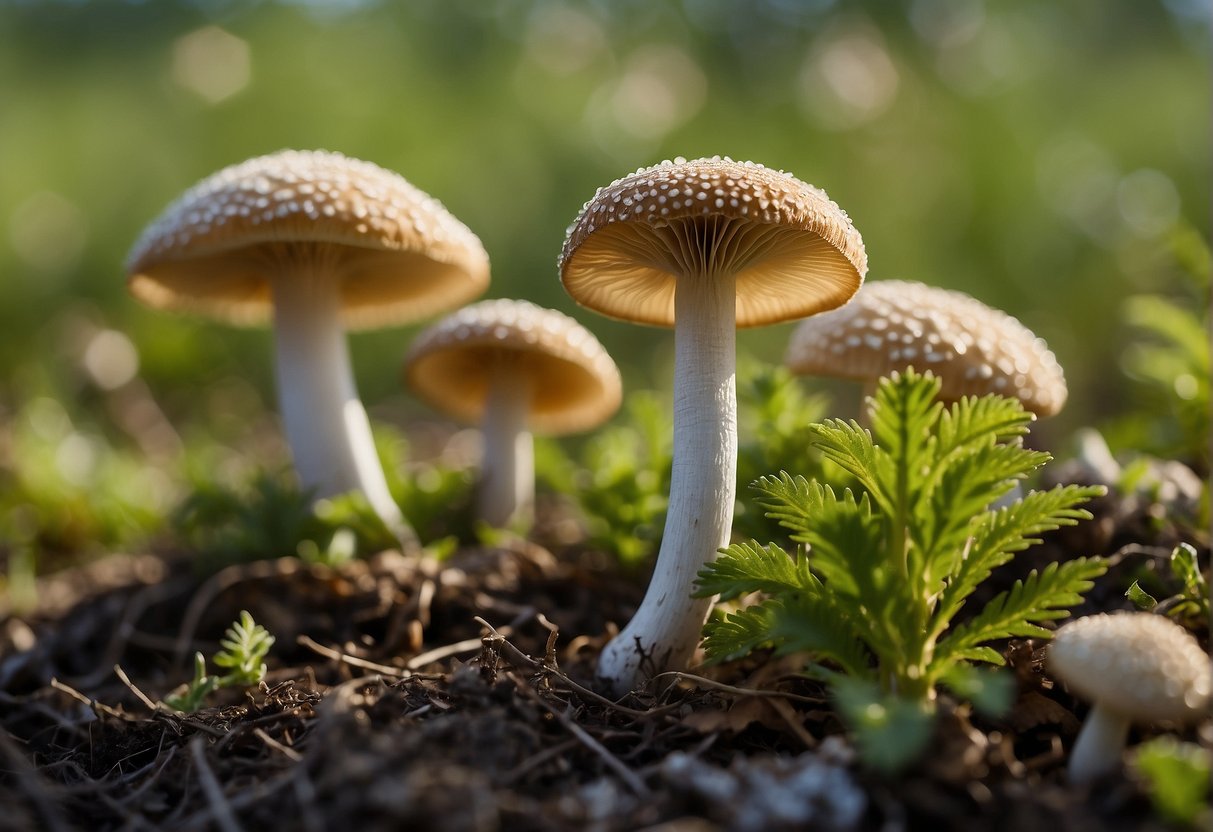
In North Dakota, the legal landscape surrounding psychedelic mushrooms is restrictive. Possession, cultivation, and distribution are criminal offenses with consequential penalties, which also pose significant barriers to research and medicinal exploration.
Penalties for Possession, Cultivation, and Distribution
In North Dakota, if you are found in possession, the cultivation, or distribution of psychedelic mushrooms, you face severe legal consequences. Psychedelic mushrooms are considered a Schedule I controlled substance, and engagement in any of these activities can lead to felony charges. For instance:
- Possession: A charge that can potentially be classified as a Class C felony.
- Cultivation and Distribution: Carrying similar or more severe penalties, with the potential to escalate depending on the scale of the activity.
Please note that specific penalties vary and can include substantial fines and imprisonment.
Impact on Research and Medicinal Use
Your ability to conduct research with psilocybin, the active compound in psychedelic mushrooms, is highly restricted due to its illegal status. Efforts to explore the medicinal use of psychedelic mushrooms, such as studying their potential for treating mental health conditions, are hampered by these legal constraints. Without a legal framework to allow for controlled scientific inquiry, the development of potentially therapeutic substances from psychedelic mushrooms remains limited in North Dakota.
Potential Therapeutic Benefits of Psychedelics
https://www.youtube.com/watch?v=ARqIdKhS5LE&embed=true
Your curiosity about the therapeutic benefits of psychedelics, particularly psilocybin, can be enlightened by emerging research suggesting their effectiveness in treating various mental health conditions.
Evidence of Mental Health Applications
Scientific studies have provided evidence that psychedelics, particularly psilocybin, possess significant potential for treating mental health conditions such as depression, anxiety, PTS, and existential anxiety experienced by those with terminal illness. Clinical trials show that psilocybin therapy has led to notable reductions in depression and anxiety symptoms, which are maintained over time. For example, a study considering clinical potential of psilocybin has reopened the dialogue for its use in mental health treatment.
Current Research on Psilocybin and Related Compounds
Current research on psilocybin and related compounds explores their use beyond mental health. For instance, studies are investigating the efficacy of psilocybin for conditions like cluster headaches, offering hope for conditions that currently have limited treatment options. Ongoing research into psychedelics is shedding light on their mechanism of action, and while clinical applications are still being defined, the therapeutic potential continues to grow. This therapeutic potential has been noted in resources such as the Psychedelic Renaissance on Indigenous philosophies.
The Debate Over Decriminalization and Legalization
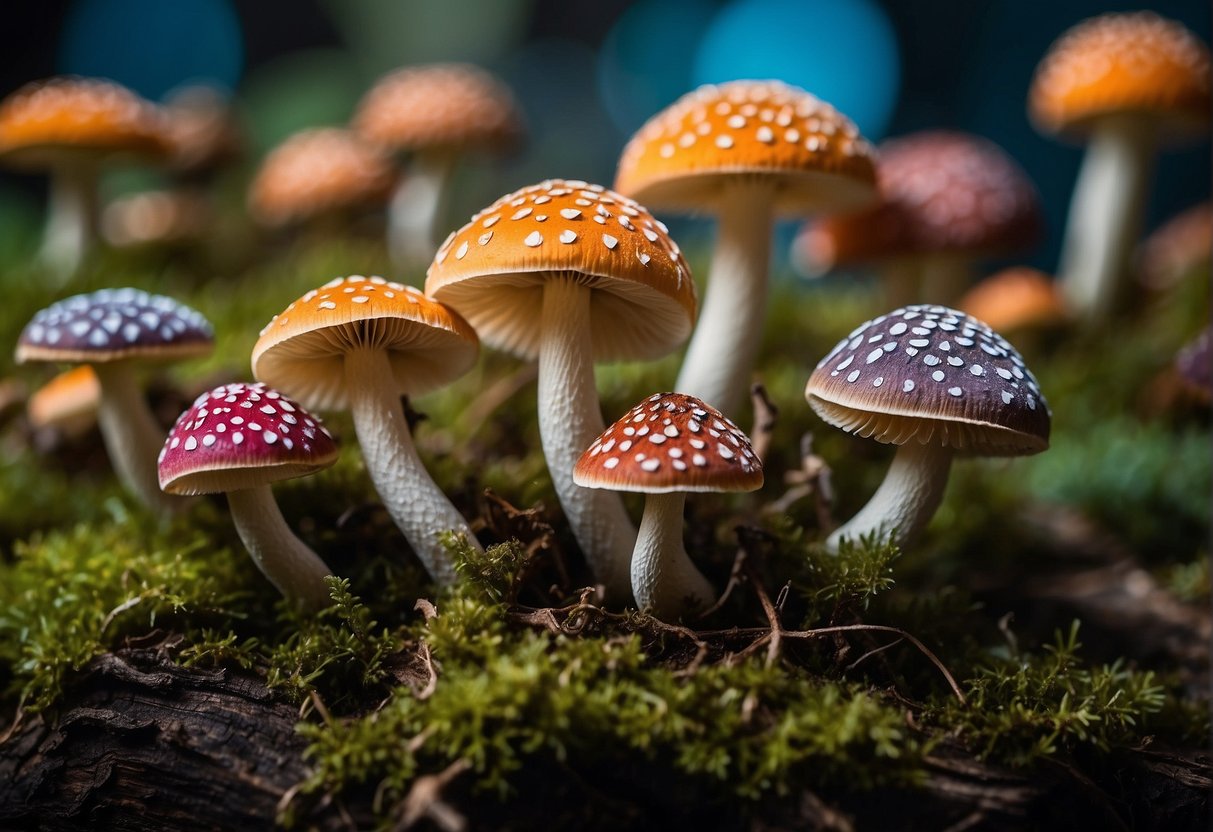
The conversation surrounding the legal status of psychedelic mushrooms touches on themes of decriminalization and legalization, often sparking discussions about their potential medical benefits and social impact. Laws at the federal level remain firm on the prohibition of these substances, yet changes are unfolding at the state level.
Arguments for Decriminalization
Advocates for decriminalization argue that natural psychedelics, including psilocybin mushrooms, should not lead to criminal penalties for possession and personal use. They point to medical research suggesting potential therapeutic benefits for mental health conditions. Decriminalization could reduce the burden on the criminal justice system, they say, emphasizing that personal, non-commercial use poses minimal societal harm. Moreover, mushroom spores themselves do not contain psilocybin and are thus in a gray area of the law in many regions.
Steps Towards Legalization in the US and Abroad
In recent years, legalization efforts have gained momentum in the United States. However, at the federal level, psychedelic mushrooms remain classified as a Schedule I substance under the Controlled Substances Act, which denotes a high potential for abuse and no recognized medical use. Despite federal resistance, some cities and states have taken significant steps:
- Medical Use: Oregon’s 2020 measure to allow medical use of psilocybin—under supervised conditions—is an unprecedented step towards therapeutic legalization.
- Recreational Use: While full recreational legalization hasn’t taken place in the US, efforts in some jurisdictions signal a growing controversy and shifting perspectives about the future of these substances.
These shifts reflect a growing trend to reconsider the controversial status of natural psychedelics and their place in society.
Regulation and Access to Psychedelic Substances
In the context of North Dakota, the legal landscape surrounding psychedelic substances is tightly regulated, influencing both medicinal application and the availability of materials necessary for their use.
Legal Framework for Medicinal Psychedelics
You should understand that the legal status of psychedelic substances for medicinal use varies by jurisdiction. In North Dakota, psychedelics such as LSD, DMT, psilocybin, and MDMA currently fall under Schedule I controlled substances, according to federal law, and possession, sale, or manufacturing of these compounds without proper authorization can lead to severe legal consequences. Medicinal research into psychedelics, while of growing interest across the country due to potential therapeutic benefits, often faces regulatory hurdles, with strict protocols necessitating specific approvals for studies or therapeutic use. Exceptions for research are limited and must comply with both state and federal regulation.
Availability of Mushroom Spores and Psychedelic Compounds
The sale of mushroom spores themselves, including those of psilocybin mushrooms, is where regulation takes an interesting turn. While psilocybin-containing mushrooms are illegal, the spores of these mushrooms do not contain psilocybin and, as such, are not regulated under the Controlled Substances Act. However, this varies by state, and in North Dakota, the intent to grow psilocybin mushrooms from these spores could be interpreted as intent to manufacture a controlled substance. When it comes to other psychedelic compounds like ketamine or ayahuasca, their availability is generally prohibited unless prescribed for a specific, approved case or part of a licensed research study.
Emerging Trends and Future of Psychedelic Research
As you explore the realm of psychedelic research, you’ll notice a significant focus on the medicinal uses of substances such as psilocybin and a societal shift toward more accepting attitudes, which are influencing both the future of psychedelics and their legal status.
Innovations in Therapeutic Applications
Psilocybin, the active compound in ‘magic mushrooms,’ is at the forefront of current psychedelic research. Studies are progressively demonstrating the therapeutic benefit of psilocybin for treatment-resistant depression, end-of-life anxiety, and PTSD, among other conditions. The medical community is actively examining how low doses of psychedelics can be incorporated into psychotherapy sessions to enhance the treatment outcome. Your awareness of these developments is crucial as this research could redefine therapeutic practices in the field of mental health.
Legal Landscape and Societal Attitudes
The legal status of psychedelics like psilocybin mushrooms is undergoing evolution with states like Oregon decriminalizing and creating a framework for therapeutic use. This doesn’t imply that they are legal everywhere; however, you should note the trend of increasing legalization movements, reflecting a shift in societal attitudes towards psychedelics. As research continues to build evidence for the medicinal uses of psychedelics, changes in the law may follow. Growing public and professional support for the medical use of psychedelics is contributing to more informed discussions about potential legal reform, indicating a future where these substances may be available for therapeutic use under controlled conditions.
References and Further Reading
If you’re seeking detailed information on the legality of psychedelic mushrooms in North Dakota, consider these authoritative resources:
- Legal Overviews: Understand the legal status of psilocybin-containing species, such as Gymnopilus validipes and Panaeolus cinctulus, by referring to state legislation and federal drug scheduling guidelines.
- Scientific Studies: Explore the biochemistry of psilocin and other active compounds in magic mushrooms to gain insights into their effects and potential therapeutic uses.
Books and Academic Journals:
- Explore the therapeutic implications of psilocybin and its intersection with law in “A Trip Through Employment Law: Protecting Therapeutic Psilocybin Users in the Workplace”.
- For a comprehensive guide on psilocybin tailored to one demographic, consider reading “The Psilocybin Handbook for Women: How Magic Mushrooms, Psychedelic Therapy, and Microdosing Can Benefit Your Mental, Physical, and Spiritual Health”.
Online Articles and Databases:
- Gain an understanding of how psychedelics are used recreationally and their cultural context through the study available at the University of Victoria’s research repository: “Psychedelic revival: a mixed-methods analysis of recreational magic mushroom (psilocybin) use for transformational, micro-dosing and leisure purposes”.
Websites for Legal Information:
- Become familiar with relevant laws and the latest updates on the legal status of psychedelics by visiting government and educational websites dedicated to drug policy.
By exploring these references and further reading materials, you can build a well-rounded understanding of the complex landscape surrounding psychedelic mushrooms and their legality in North Dakota.
Frequently Asked Questions
In this section, you’ll find specific answers regarding psychedelic mushrooms and their legal status in North Dakota.
What is the current legal status of psilocybin mushrooms in North Dakota?
Psilocybin mushrooms are currently classified as a Schedule I controlled substance in North Dakota. This means their use, possession, sale, or cultivation is illegal under state law.
Which substances related to psychedelic mushrooms are prohibited by North Dakota state law?
North Dakota state law prohibits psilocybin and psilocin, both of which are active compounds in psychedelic mushrooms, under its controlled substances list.
Are there any exceptions for the use of psychedelic mushrooms in North Dakota, such as for medical or religious purposes?
There are no exceptions for the medical or religious use of psilocybin mushrooms in North Dakota. They remain illegal for all purposes.
What are the potential legal consequences of possessing or distributing psychedelic mushrooms in North Dakota?
Possessing or distributing psychedelic mushrooms in North Dakota can lead to criminal charges, with consequences that could include heavy fines and imprisonment.
Has there been any recent legislation proposed concerning psychedelic mushrooms in North Dakota?
As of the last update, there has been no recent legislation passed in North Dakota that would alter the current legal status of psychedelic mushrooms.
Are there any movements or organizations within North Dakota advocating for the reform of laws related to psychedelic mushrooms?
While there is growing interest in psychedelic policy reform nationwide, specific movements or organizations in North Dakota focusing on this issue are not prominent as of this time.

